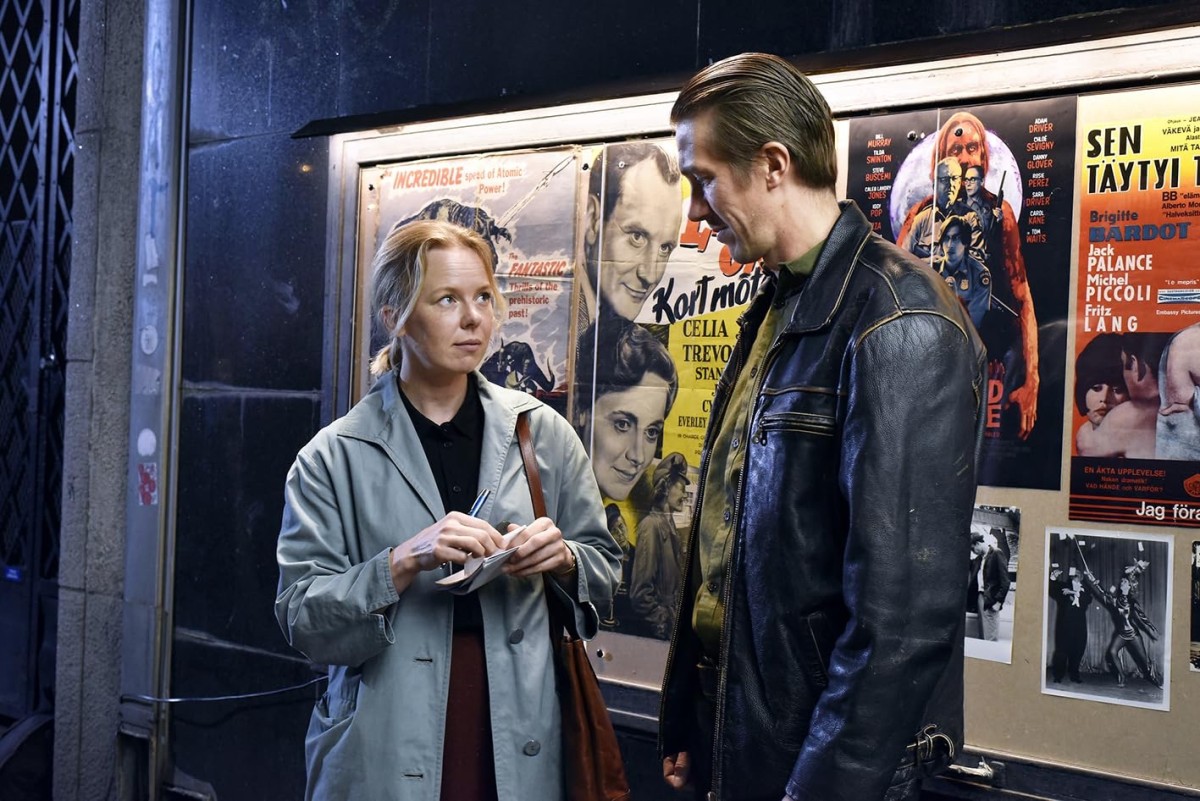How do we find love in the time of war and global conflict? In his newest film, “Fallen Leaves,” Finnish director Aki Kaurismäki answers this question in a quaint, European way. This film explores anxiety and our innate desire for love during the bleakest times of Ukrainian war.
A Cannes Jury Prize Winner and Finland’s entry for best international feature to the Academy Awards, the story is set in a dreamlike version of the modern world. It follows two disillusioned working-class loners as they hop from one job to the next, forming a deep connection along the way. Ansa (Alma Pöysti), a zero-hour contract supermarket stocker, gets fired for trying to steal an expired sandwich at work. When she walks into a karaoke bar, she meets the alcoholic construction worker Holappa (Jussi Vatanen). As they spend more time together, a delightful romance develops between two social outcasts and classic rom-com tropes ensue, ranging from kitschy movie dates to misunderstandings and reconciliation.
“Fallen Leaves” is a subtle love story. Kaurismäki intentionally avoids capturing moments of physical affection or an extravagant declaration of love, and his writing is extremely dry in both its drama and humor. His detached approach to narrative also applies to the setting, which takes place in a version of modern-day Europe that still uses dated technology — the characters use landline phones and old-fashioned radios. News of world events, like the 2022 Russian invasion of Ukraine, are covered only on radio programs and print newspapers, as opposed to our modern TV or social media. His appealing use of retro technology indicates that the anxiety of imminent war is not specific to any one moment in time, but rather a more general feeling that has echoed throughout every generation.
Despite the depressing setting and stiff tone, the film has an added layer of much-needed levity, thanks to Kaurismaki’s ability to find deadpan humor in the mundane. While this dryness works for the film’s comedy, it does stunt the depth of the relationship between the two leads. Both Pöysti and Vatanen give incredibly charming and moving performances of two broken-yet-persevering people you can’t help but root for. But their characters feel underdeveloped at times.
“Fallen Leaves” occasionally falters due to its structure, and Kaurismäki’s interest in the mundane can feel self-indulgent. He pushes important character moments to the side in favor of reveling in his stylized world. The director’s focus on his stylistic frame and look does not allow any room for his characters to become fully realized. If the film allowed for more connections with the characters, their journeys would have been more fulfilling. Instead, the film’s conclusion seems unsatisfying at best.
Angelika Film Center is known for the nostalgic 1960s-’70s aesthetic of his filmmaking. A staunch critic of digital cinematography, the director utilizes 35mm film stock to give the film the aesthetic of an older picture. As such, “Fallen Leaves” feels lived-in and textured. It is a delicate treat for the eyes and ears with the crackles and pops of the audio tracks, and the observable film grain is only achievable with analog technology. With its beautifully textured production design and pastel environment, the film evokes the golden age of European cinema. Characters sing and dance in colorful retro bars and watch movies in small single-screen cinemas, giving the film endearing nostalgia.
The role of modern-day politics in the shadows of the protagonists’ lives is also bolstered by the vintage setting. At times, Ansa or Holappa turn on the radio or read the paper about the waging war in Ukraine. Kaurismäk quietly comments on the anxiety of impending global conflict — noting the Russian threat on Finland — and learns to carry on regardless. He is less interested in world political crises than he is in the disillusionment that it breeds. Through this recurring theme, the film creates a relatable stance on politics and a desire to find solace in a crumbling world.
Despite the structural issues of the film, Kaurismäki’s “Fallen Leaves” is a charming and delightful existential crisis that ultimately feels alive and hopeful in the modern world. With its intensely appealing visuals and great laughs, this strangely endearing reflection on connection and adversity is a perfect film for grappling with our reality.
Fallen Leaves opens in theaters in New York on Nov. 17, and is playing now at the Angelika Film Center.
Contact Gabriel Murray at [email protected].
























































































































































